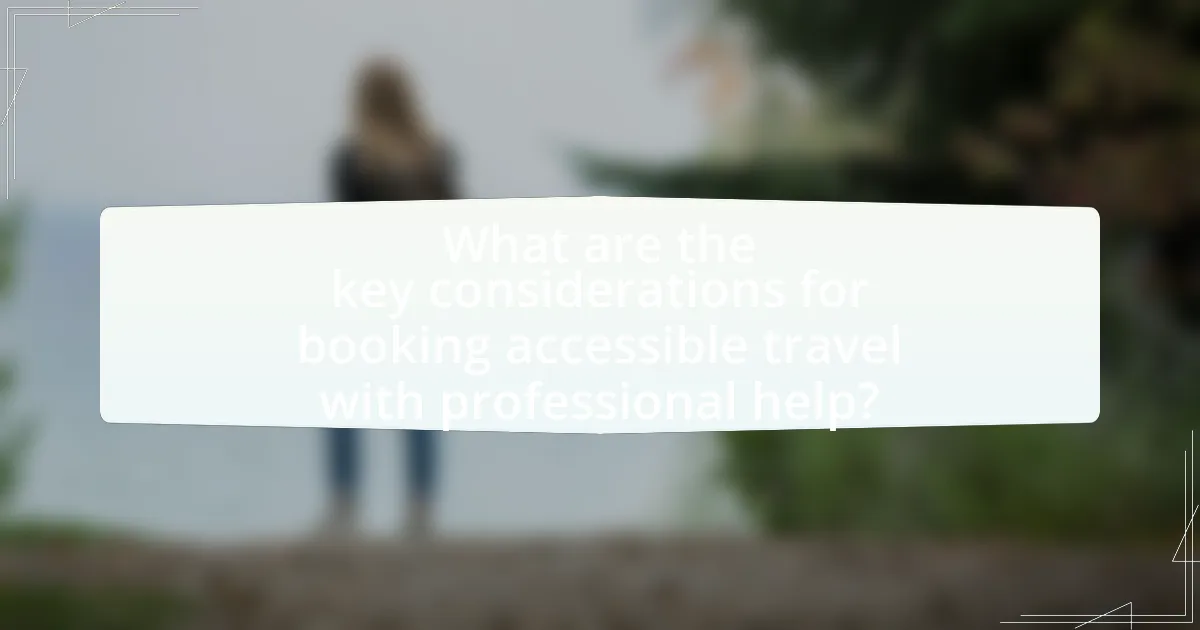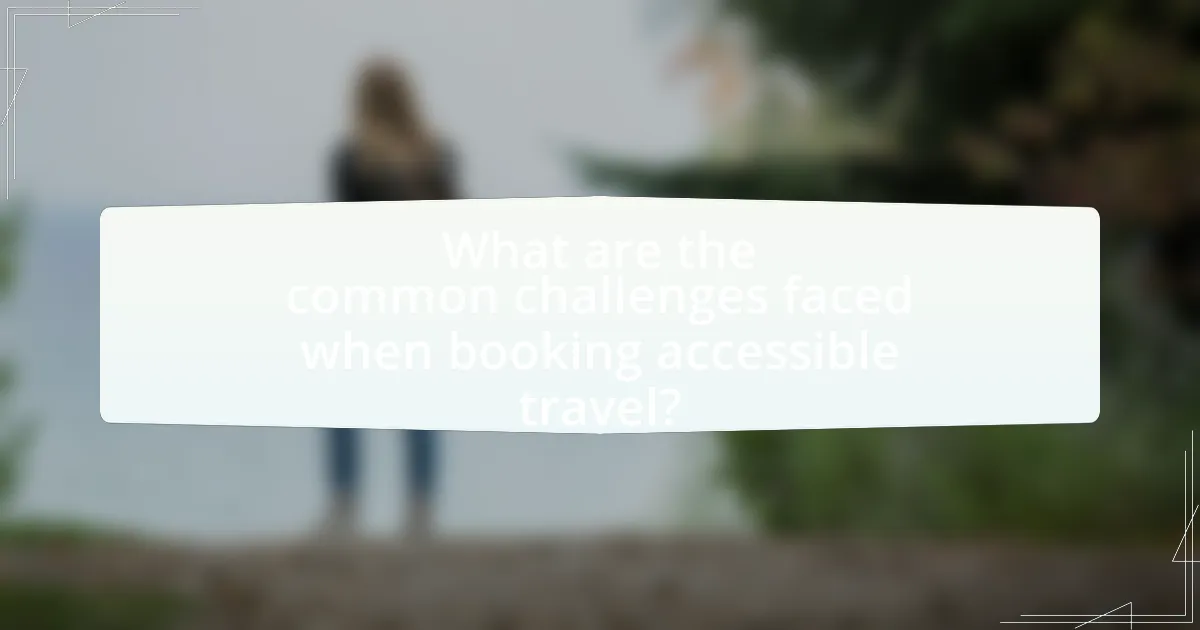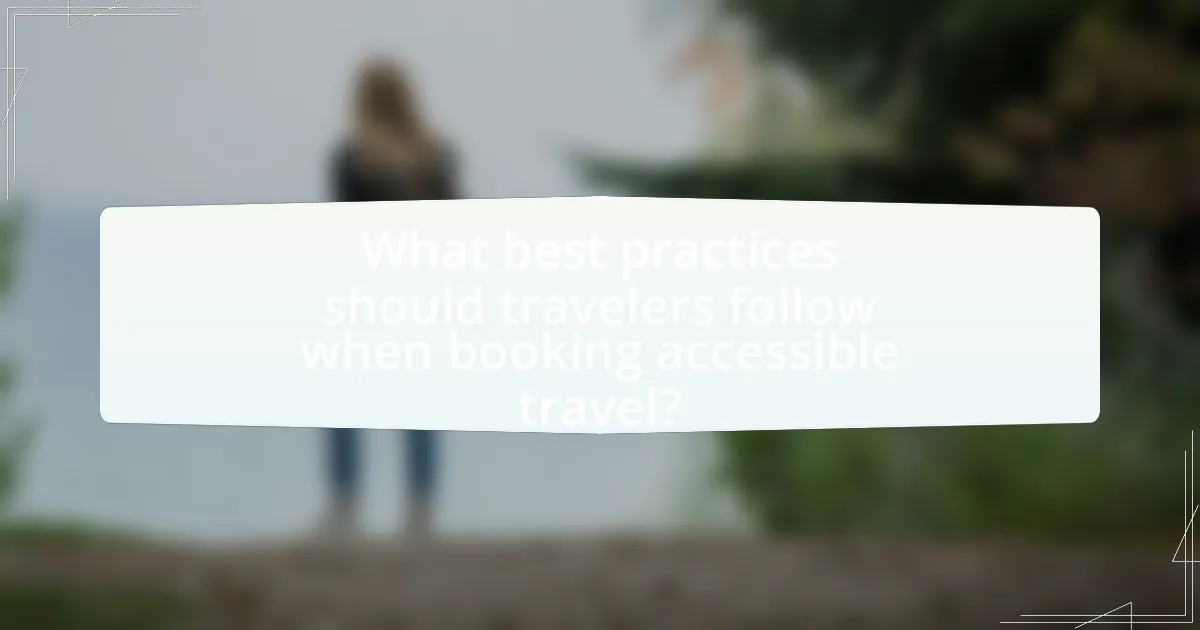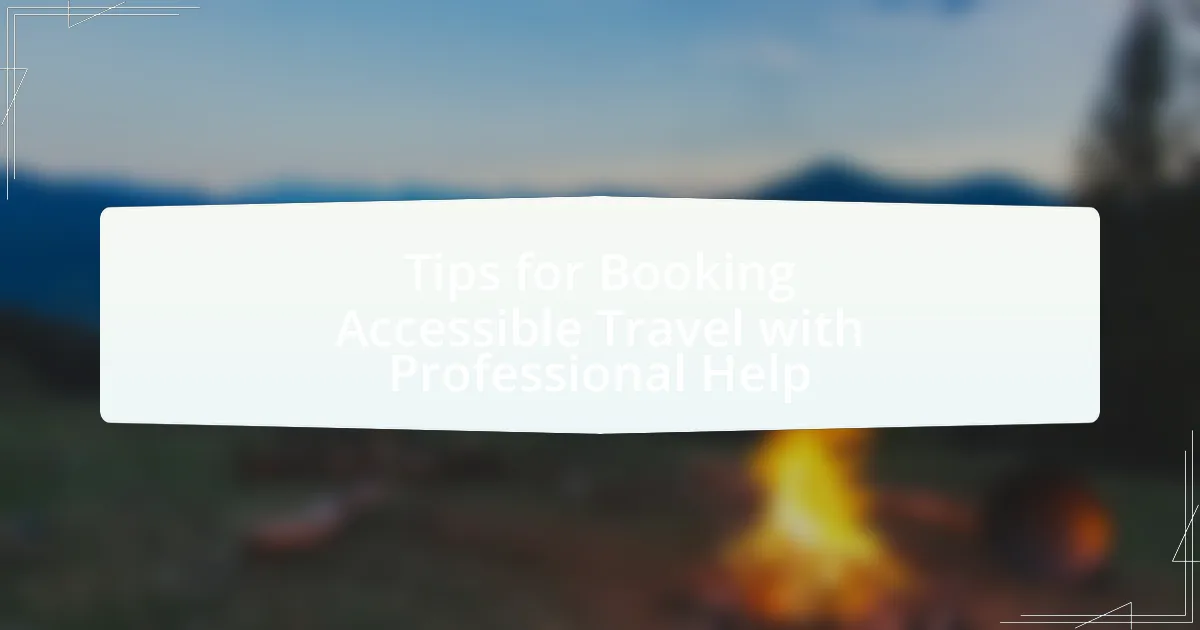The article focuses on essential tips for booking accessible travel with professional help, emphasizing the importance of understanding individual accessibility needs and working with specialized travel agents. Key considerations include verifying accommodations and transportation options, as well as ensuring that travel professionals possess expertise in accessible travel. The article highlights specific requirements such as mobility needs, sensory accommodations, and communication assistance, while also addressing common challenges faced by travelers with disabilities. Additionally, it outlines strategies for effective communication with service providers and the advantages of utilizing specialized resources to enhance the overall travel experience.

What are the key considerations for booking accessible travel with professional help?
Key considerations for booking accessible travel with professional help include understanding specific accessibility needs, verifying accommodations and transportation options, and ensuring that the travel agent has expertise in accessible travel. Identifying individual requirements, such as wheelchair accessibility or dietary restrictions, is crucial for a tailored experience. Research indicates that 70% of travelers with disabilities prioritize accessibility features when planning trips, highlighting the importance of confirming that hotels and transport services meet these needs. Additionally, working with agents who specialize in accessible travel can provide valuable insights and resources, ensuring a smoother travel experience.
How can understanding accessibility needs improve travel experiences?
Understanding accessibility needs can significantly enhance travel experiences by ensuring that all travelers, regardless of their physical limitations, can fully participate in and enjoy their journeys. When travel providers prioritize accessibility, they create environments that accommodate diverse needs, leading to increased satisfaction and comfort for all guests. For instance, according to a study by the Open Doors Organization, 26% of American adults with disabilities travel, and they collectively spend over $17 billion annually on travel, indicating a substantial market that values accessible options. By addressing accessibility needs, travel companies not only comply with legal requirements but also tap into this growing demographic, fostering loyalty and positive word-of-mouth.
What specific accessibility requirements should travelers consider?
Travelers should consider mobility needs, sensory accommodations, and communication assistance as specific accessibility requirements. Mobility needs include wheelchair access, ramps, and elevators at accommodations and transportation. Sensory accommodations involve options for those with hearing or vision impairments, such as visual aids or hearing loops. Communication assistance may include the availability of interpreters or materials in accessible formats. According to the World Health Organization, over 1 billion people experience some form of disability, highlighting the importance of addressing these requirements to ensure inclusive travel experiences.
How do different disabilities impact travel planning?
Different disabilities significantly impact travel planning by influencing the choice of destinations, modes of transportation, accommodations, and activities. For instance, individuals with mobility impairments may require wheelchair-accessible transportation and accommodations, while those with visual impairments may need assistance navigating unfamiliar environments. Additionally, travelers with hearing impairments might prioritize destinations that offer visual alerts and services. Research indicates that approximately 15% of the global population lives with some form of disability, highlighting the necessity for tailored travel planning to ensure accessibility and comfort.
Why is professional help important in booking accessible travel?
Professional help is important in booking accessible travel because it ensures that specific needs are met accurately and efficiently. Travel agents specializing in accessible travel possess in-depth knowledge of accommodations, transportation options, and services tailored for individuals with disabilities. For instance, they can identify hotels with accessible rooms, arrange for wheelchair-accessible transportation, and provide insights on destinations that are friendly to travelers with mobility challenges. This expertise minimizes the risk of booking errors that could lead to discomfort or accessibility issues during the trip, ultimately enhancing the travel experience for individuals requiring special accommodations.
What advantages do travel agents offer for accessible travel bookings?
Travel agents offer significant advantages for accessible travel bookings by providing specialized knowledge and personalized services tailored to individual needs. They have access to a wide range of resources, including information on accessible accommodations, transportation options, and attractions that cater to travelers with disabilities. Additionally, travel agents can advocate on behalf of their clients, ensuring that specific accessibility requirements are met, which can reduce the stress and uncertainty often associated with planning accessible travel. Their expertise can lead to better itineraries that maximize comfort and enjoyment, ultimately enhancing the travel experience for individuals with accessibility needs.
How can professionals assist in navigating accessibility regulations?
Professionals can assist in navigating accessibility regulations by providing expert guidance on compliance requirements and best practices. They possess in-depth knowledge of local, national, and international accessibility laws, such as the Americans with Disabilities Act (ADA) in the United States, which mandates accessible facilities and services. By leveraging their expertise, professionals can help organizations understand specific regulations that apply to their operations, ensuring that travel services meet the necessary accessibility standards. This support can include conducting audits, offering training, and developing policies that align with legal requirements, ultimately facilitating a smoother experience for travelers with disabilities.
What resources are available for finding accessible travel professionals?
To find accessible travel professionals, individuals can utilize specialized directories such as the Accessible Travel Directory, which lists travel agents and companies that focus on accessible travel services. Additionally, organizations like the National Association of Travel Agents (NATA) and the American Society of Travel Advisors (ASTA) provide resources and referrals for travel agents experienced in accessible travel. These resources are validated by their focus on inclusivity and support for travelers with disabilities, ensuring that clients receive tailored assistance for their specific needs.
Where can travelers find specialized travel agencies for accessibility needs?
Travelers can find specialized travel agencies for accessibility needs through online directories and resources dedicated to accessible travel. Websites such as the International Air Transport Association (IATA) provide lists of travel agencies that focus on accessibility, while organizations like the National Federation of the Blind and the American Association of People with Disabilities offer recommendations for agencies that cater to specific accessibility requirements. Additionally, platforms like Accessible Travel Online and Travel for All specifically list agencies that specialize in creating travel experiences for individuals with disabilities, ensuring that travelers can access tailored services and support.
What online platforms provide information on accessible travel services?
Online platforms that provide information on accessible travel services include Accessible Travel Online, which offers resources and booking options specifically for travelers with disabilities. Another notable platform is Mobility International USA, which focuses on international travel accessibility and provides a wealth of information on accessible destinations and services. Additionally, websites like TripAdvisor feature user-generated reviews and tips on accessible accommodations and attractions, making it easier for travelers to find suitable options. These platforms are recognized for their commitment to enhancing travel experiences for individuals with disabilities, ensuring they have access to necessary information and resources.
How can travelers effectively communicate their accessibility needs?
Travelers can effectively communicate their accessibility needs by clearly outlining specific requirements to travel agents or service providers. This includes detailing mobility limitations, necessary equipment, and any assistance required during travel. For instance, providing information about wheelchair accessibility, the need for accessible restrooms, or assistance with boarding can help ensure that accommodations are made. Research indicates that clear communication of accessibility needs leads to better travel experiences, as service providers can tailor their offerings to meet those needs effectively.
What information should be shared with travel professionals?
Travel professionals should be provided with detailed information about the specific accessibility needs of the traveler. This includes mobility requirements, medical conditions, preferred accommodations, and any necessary assistive devices. Sharing this information ensures that travel professionals can tailor travel arrangements to meet the individual’s needs effectively. For instance, according to the World Health Organization, approximately 15% of the global population experiences some form of disability, highlighting the importance of personalized travel planning to enhance accessibility and comfort.
How can travelers ensure their needs are met during the booking process?
Travelers can ensure their needs are met during the booking process by clearly communicating their specific requirements to travel agents or booking platforms. This includes detailing any accessibility needs, such as wheelchair access, dietary restrictions, or assistance with mobility. Research indicates that effective communication significantly enhances customer satisfaction, as evidenced by a study from the Journal of Travel Research, which found that 78% of travelers reported a better experience when their needs were explicitly addressed during the booking phase. By providing detailed information upfront, travelers can facilitate a smoother booking process and ensure that their preferences are accommodated.

What are the common challenges faced when booking accessible travel?
Common challenges faced when booking accessible travel include limited availability of accessible accommodations, inadequate information on accessibility features, and difficulties in communication with service providers. Many hotels and transportation services do not have comprehensive listings of their accessibility options, making it hard for travelers to find suitable options. Additionally, service providers may lack training in addressing the specific needs of travelers with disabilities, leading to misunderstandings and unmet requirements. According to a study by the Open Doors Organization, 27% of travelers with disabilities reported that they encountered issues with accessibility during their trips, highlighting the prevalence of these challenges.
What obstacles do travelers with disabilities encounter in the booking process?
Travelers with disabilities encounter several obstacles in the booking process, including limited access to information about accessible options, inadequate customer service training, and a lack of standardized accessibility features across travel platforms. Many booking websites do not clearly indicate which accommodations or transportation services are accessible, making it difficult for travelers to make informed choices. Additionally, customer service representatives often lack the necessary training to assist travelers with specific accessibility needs, leading to miscommunication and frustration. Research indicates that 70% of travelers with disabilities report challenges in finding suitable travel arrangements, highlighting the systemic issues within the travel industry regarding accessibility.
How can misinformation affect accessible travel bookings?
Misinformation can significantly hinder accessible travel bookings by leading to incorrect assumptions about the availability of accommodations and services. For instance, if travelers believe that a hotel is wheelchair accessible based on misleading information, they may arrive only to find that it does not meet their needs, resulting in wasted time and resources. A study by the International Air Transport Association found that 30% of travelers with disabilities reported issues related to accessibility due to inaccurate information. This highlights the critical need for accurate and reliable data in the travel industry to ensure that individuals with disabilities can make informed decisions and secure appropriate travel arrangements.
What are the risks of not using professional help for accessible travel?
Not using professional help for accessible travel significantly increases the risk of encountering inadequate accommodations and services. Individuals may face challenges such as inaccessible transportation, unsuitable lodging, and a lack of necessary support services, which can lead to physical barriers and safety concerns. For instance, a study by the Open Doors Organization found that 70% of travelers with disabilities reported difficulties in finding accessible accommodations when traveling without professional assistance. This highlights the importance of expert guidance in ensuring a smooth and safe travel experience for individuals with accessibility needs.
How can travelers overcome these challenges?
Travelers can overcome challenges in booking accessible travel by utilizing specialized travel agencies that focus on accessibility. These agencies possess expertise in identifying suitable accommodations, transportation options, and activities that cater to travelers with disabilities. For instance, research from the World Health Organization indicates that approximately 15% of the global population experiences some form of disability, highlighting the importance of tailored travel solutions. By leveraging the knowledge and resources of these professionals, travelers can ensure a smoother and more enjoyable travel experience.
What strategies can be employed to ensure successful bookings?
To ensure successful bookings for accessible travel, employing a combination of clear communication, thorough research, and utilizing specialized services is essential. Clear communication with travel providers about specific accessibility needs helps in tailoring the experience to individual requirements. Thorough research on destinations and accommodations that prioritize accessibility ensures that travelers are informed about their options. Utilizing specialized travel agencies that focus on accessible travel can provide expert guidance and resources, increasing the likelihood of a smooth booking process. According to a study by the Open Doors Organization, 26% of Americans with disabilities travel, highlighting the importance of addressing their unique needs in the booking process.
How can travelers advocate for their needs during the travel planning process?
Travelers can advocate for their needs during the travel planning process by clearly communicating their specific requirements to travel agents or service providers. This involves detailing any accessibility needs, such as wheelchair access, dietary restrictions, or assistance with mobility. Research indicates that effective communication can significantly enhance the travel experience for individuals with disabilities, as it allows service providers to tailor their offerings accordingly. For instance, a study by the World Health Organization highlights that 15% of the global population experiences some form of disability, emphasizing the importance of addressing these needs in travel planning.

What best practices should travelers follow when booking accessible travel?
Travelers should prioritize thorough research and communication when booking accessible travel. This involves identifying specific accessibility needs, such as wheelchair access or assistance for visual impairments, and confirming that accommodations, transportation, and activities meet these requirements. According to a study by the Open Doors Organization, 1 in 4 adults with disabilities reported difficulties in finding accessible travel options, highlighting the importance of clear communication with service providers to ensure that all needs are met. Additionally, travelers should consider using specialized travel agencies that focus on accessible travel, as they often have established relationships with providers and can offer tailored solutions.
How can travelers prepare for a successful accessible travel experience?
Travelers can prepare for a successful accessible travel experience by conducting thorough research on destinations, accommodations, and transportation options that cater to accessibility needs. This preparation includes checking for wheelchair accessibility, availability of assistive devices, and the presence of accessible amenities at hotels and attractions. According to a study by the Open Doors Organization, 26% of American adults with disabilities travel, highlighting the importance of accessible options in the travel industry. Additionally, contacting travel agencies that specialize in accessible travel can provide tailored assistance and ensure that all necessary accommodations are arranged in advance.
What documents and information should be gathered before booking?
Before booking accessible travel, gather essential documents and information such as identification (passport or driver’s license), travel insurance details, medical information (including any disabilities or special needs), and specific requirements for accessibility (like wheelchair specifications or mobility aids). These documents ensure that travel arrangements meet individual needs and comply with regulations. For instance, having medical documentation can facilitate necessary accommodations with airlines or hotels, as many providers require proof of disability to offer specific services.
How can travelers create a checklist for their accessibility needs?
Travelers can create a checklist for their accessibility needs by identifying specific requirements related to mobility, communication, and sensory preferences. First, they should assess their personal needs, such as wheelchair access, assistance with boarding, or dietary restrictions. Next, they can research accommodations, transportation options, and activities that cater to these needs, ensuring they confirm accessibility features directly with service providers. According to a study by the Open Doors Organization, 27% of travelers with disabilities reported difficulties in finding accessible travel options, highlighting the importance of thorough preparation. By compiling this information into a checklist, travelers can ensure a smoother and more enjoyable travel experience.
What tips can enhance the overall travel experience for individuals with disabilities?
To enhance the overall travel experience for individuals with disabilities, it is essential to prioritize accessibility in all aspects of travel planning. Research indicates that 70% of travelers with disabilities report difficulties in finding accessible accommodations and transportation options. Therefore, individuals should seek travel agencies that specialize in accessible travel, as these professionals can provide tailored recommendations and ensure that all necessary accommodations are in place. Additionally, travelers should communicate their specific needs in advance to airlines, hotels, and tour operators, which can lead to better service and fewer complications during the trip. Utilizing resources such as the ADA National Network can also provide valuable information on accessible destinations and services, further improving the travel experience.
How can travelers stay informed about accessibility options at destinations?
Travelers can stay informed about accessibility options at destinations by utilizing dedicated resources such as accessibility-focused websites, travel agencies specializing in accessible travel, and local tourism boards. These platforms often provide detailed information on wheelchair accessibility, transportation options, and accommodations that cater to individuals with disabilities. For instance, websites like AccessibleGO and the International Air Transport Association (IATA) offer comprehensive guides and user-generated reviews that highlight accessibility features at various destinations. Additionally, contacting local tourism offices directly can yield specific insights into the accessibility of attractions and services in the area.
What are the best ways to ensure smooth communication with service providers?
The best ways to ensure smooth communication with service providers include establishing clear expectations, using concise language, and maintaining regular follow-ups. Clear expectations help both parties understand the scope of services and deadlines, reducing misunderstandings. Concise language minimizes confusion and ensures that key points are communicated effectively. Regular follow-ups, such as confirming details or checking on progress, reinforce accountability and keep the lines of communication open. These practices are supported by research indicating that effective communication strategies can enhance collaboration and satisfaction in service interactions.
What are the key takeaways for booking accessible travel with professional help?
The key takeaways for booking accessible travel with professional help include understanding specific accessibility needs, utilizing specialized travel agents, and confirming accommodations and transportation options in advance. Identifying individual requirements, such as wheelchair access or dietary restrictions, ensures tailored travel experiences. Professional travel agents with expertise in accessible travel can provide valuable insights and resources, enhancing the overall planning process. Additionally, verifying that hotels, airlines, and transportation services meet accessibility standards is crucial, as studies show that 70% of travelers with disabilities encounter issues related to accessibility during their trips.
How can travelers ensure they receive the best support for their needs?
Travelers can ensure they receive the best support for their needs by clearly communicating their specific requirements to travel professionals. This includes detailing any mobility issues, dietary restrictions, or other personal preferences that may affect their travel experience. Research indicates that effective communication leads to higher satisfaction rates; for instance, a study by the American Society of Travel Advisors found that 87% of travelers who discussed their needs with agents reported a more tailored experience. By being proactive and transparent, travelers can help professionals provide the most suitable options and accommodations.
What final advice can help travelers navigate the accessible travel landscape?
Travelers should prioritize thorough research and communication when navigating the accessible travel landscape. This involves identifying specific accessibility needs and ensuring that travel providers can accommodate them. For instance, according to a 2021 report by the World Health Organization, approximately 15% of the global population experiences some form of disability, highlighting the importance of tailored services. Engaging with travel agents who specialize in accessible travel can provide valuable insights and resources, ensuring that accommodations, transportation, and activities meet individual requirements.

Leave a Reply